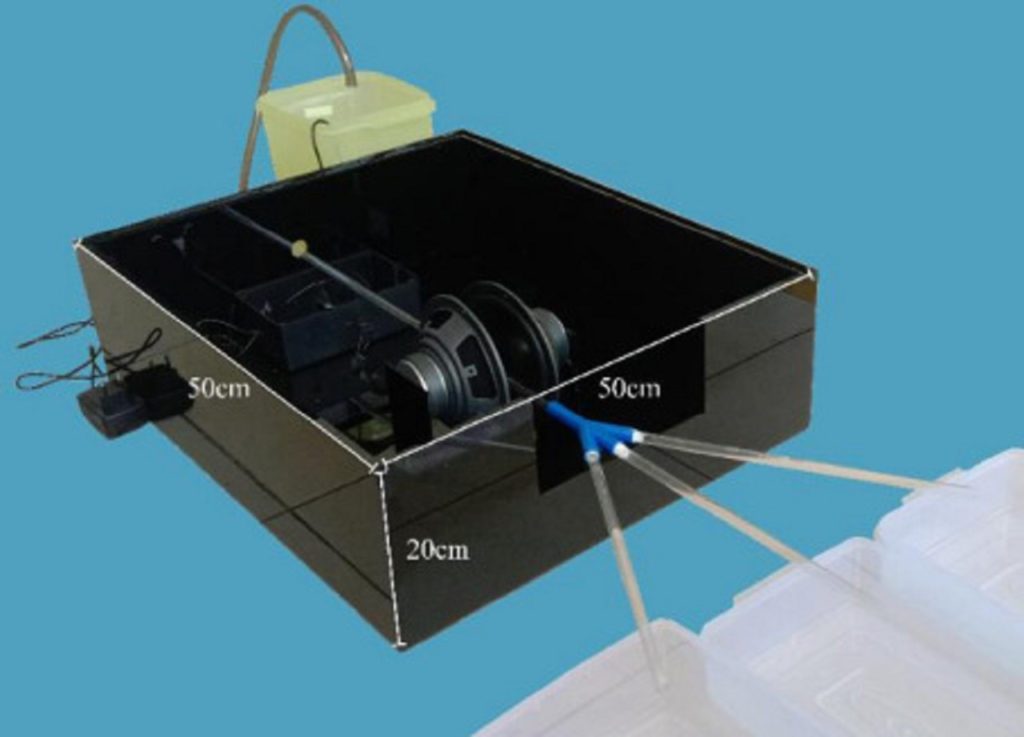ITS Students’ Innovation for a Microplastic-free Ocean

The microplastic-contaminated water filter prototype made by the ITS student team
ITS Campus, ITS News – Marine plastic waste can degrade into microplastics that can contaminate the food chain of marine life. The microplastics contaminated marine products can be harmful for human consumption. Concerned on this problem, the Institut Teknologi Sepuluh Nopember (ITS) students innovated a microplastic-contaminated water filter based on Bulk Acoustic Wave (BAW).
Based on data from the Indonesian Plastic Industry Association (INAPLAS) and the Central Statistics Agency (BPS), as much as 3.2 million tons of plastic waste is dumped into Indonesian seas every year. The plastic waste will be degraded into microplastics and can contaminate marine life. “There is no technology applied by the Indonesian government in handling and reducing microplastics,” said Arkilaus Bellinus Felle, the team leader.

(from left) Arkilaus Bellinus Felle, Nur Indah Sari, Dr Dhany Arifianto ST MEng, Laila Sifha Urrohma, and Dian Permana
The man who is familiarly called Billy explained that the filter made by his team utilizes acoustic waves originating from loudspeakers or speakers. This acoustic wave will push the microplastic particles to be separated from seawater. “Because of its tiny size, a special method for filtering microplastic particles is needed,” he explained.
This tool can filter all types and forms of microplastics contained in seawater and freshwater. This tool no longer requires a mechanical filter by utilizing acoustic wave technology, so there is no need to clean the filter regularly, and it will last longer. “This innovation symbolizes the 14 SDGs (Sustainable Development Goals) points about maintaining marine ecosystems,” said this freshly graduated student.
This tool works by pumping water until it flows into the component through an acrylic pipe. Seawater will flow through two full-range speakers flanking an acrylic pipe in the middle. The speaker will cause a thrust called an acoustophoretic force. “The frequency on the speaker is 6.813 Hz to get the highest efficiency,” explained the alumnus of the Engineering Physics Department.

Schematic of the microplastic polluted water filter prototype designed by the ITS student team
Explained further, Billy said that there are three pipe branches at the end of the tool. The microplastic particles will be concentrated in the middle pipeline, while the filtered water will be channeled to the sea through the right and left end pipes. “This tool takes 1-2 minutes to filter out particles with an efficiency of up to 71 percent,” said the man who was born in Balikpapan in 1998.
Billy also explained that the water pressure, flow rate, and contact time between particles need to be adjusted so that water can flow into the right and left lanes and not mix with microplastics again. “Calculations and simulations are carried out with Matlab software,” he added further.
Together with three team members from the Engineering Physics Department, namely Berliana Nur Indah Sari, Laila Sifha Urrohma, and Dian Permana, Billy proposed an innovation titled Design and Build a Microplastic Polluted Water Filter Based on Bulk Acoustic Wave. With the guidance of a lecturer from the Physics Engineering Department, Dr Dhany Arifianto ST MEng, this team managed to win a silver medal at the 2021 National Student Scientific Week (Pimnas) in the Poster Category Student Creativity Program (PKM-KC).
Billy and his team hope that this innovation can be developed further, not stopping at this Ministry of Education, Culture, Research, and Technology (Kemendikbudristek) event only. He also advised students who want to participate in Pimnas in the next period always to try their best. “Always make the most of the opportunity, no matter how small,” he encouraged. (nadh/ITS Public Relations)
Reporter: Frecia Elrivia Mardianto
Related News
-
ITS Collaboration with BPBD East Java, Launching VR Disaster Simulation
ITS Campus, ITS News — Supporting anticipation of disasters and continuing to educate the public, Institut Teknologi Sepuluh Nopember
December 03, 2021 17:12 -
Supporting the Implementation of Innovative Ideas, ITS and IYSA Hold International Competition
ITS Campus, ITS News — Institut Teknologi Sepuluh Nopember (ITS) has once again proven its commitment to supporting the
December 03, 2021 17:12 -
ITS Maintains Informative Qualification for Five Consecutive Years at KIP Awards
ITS Campus, ITS News — Institut Teknologi Sepuluh Nopember (ITS) has once again successfully maintained its Informative Qualification predicate
December 03, 2021 17:12 -
ITS Strengthens Smart Eco-Campus through UI GreenMetric 2024
ITS Campus, ITS News — Institut Teknologi Sepuluh Nopember (ITS) has once again demonstrated its commitment to environmental concern
December 03, 2021 17:12
